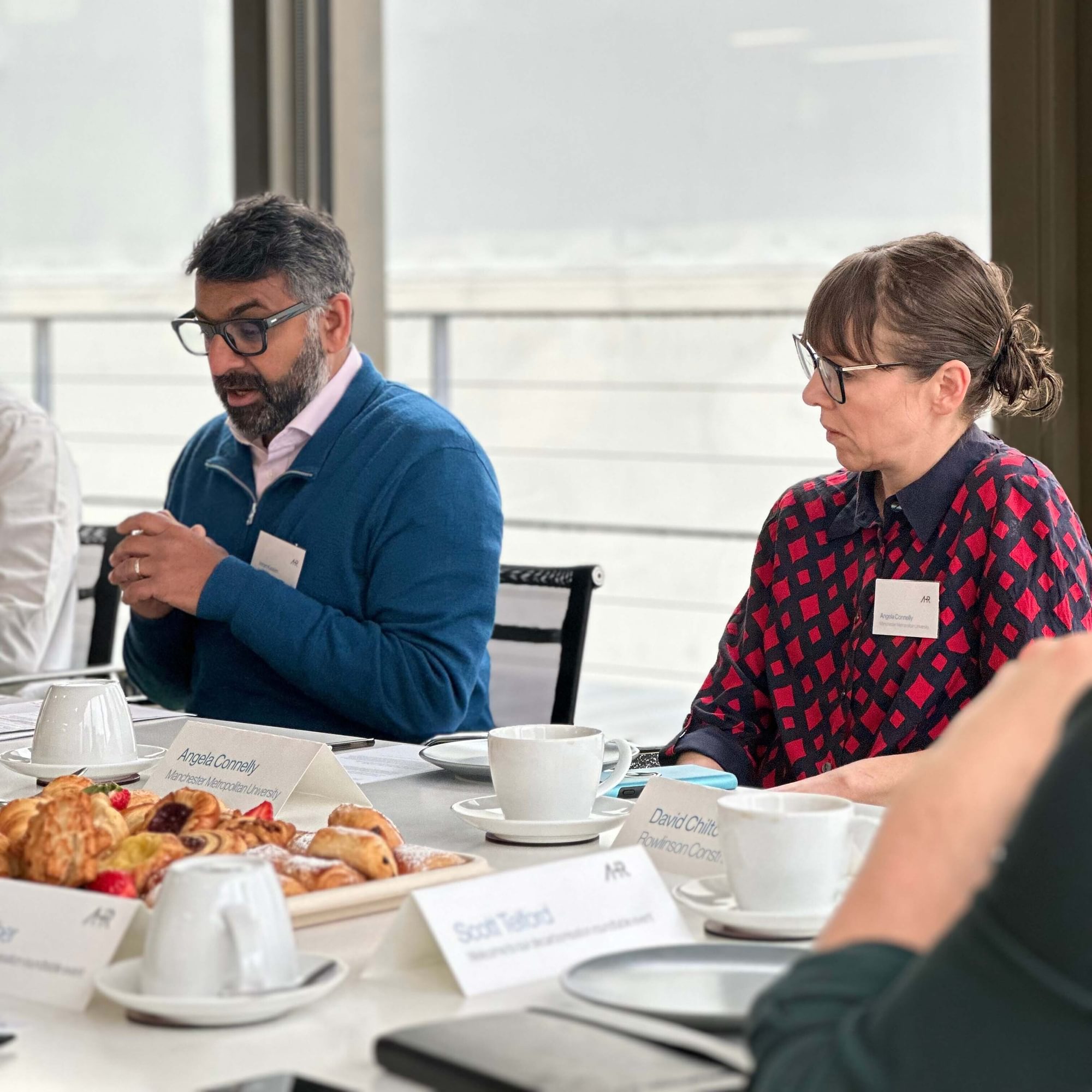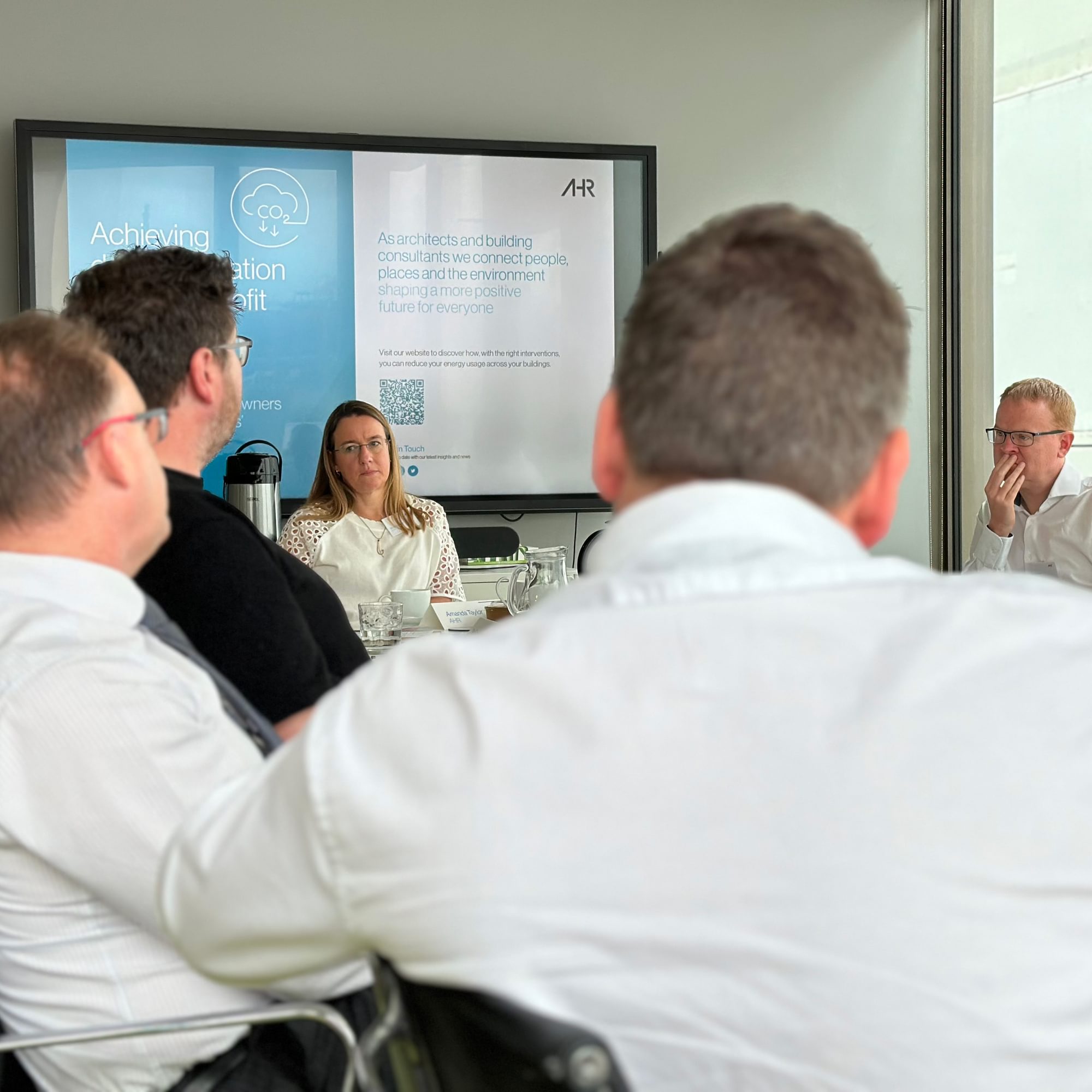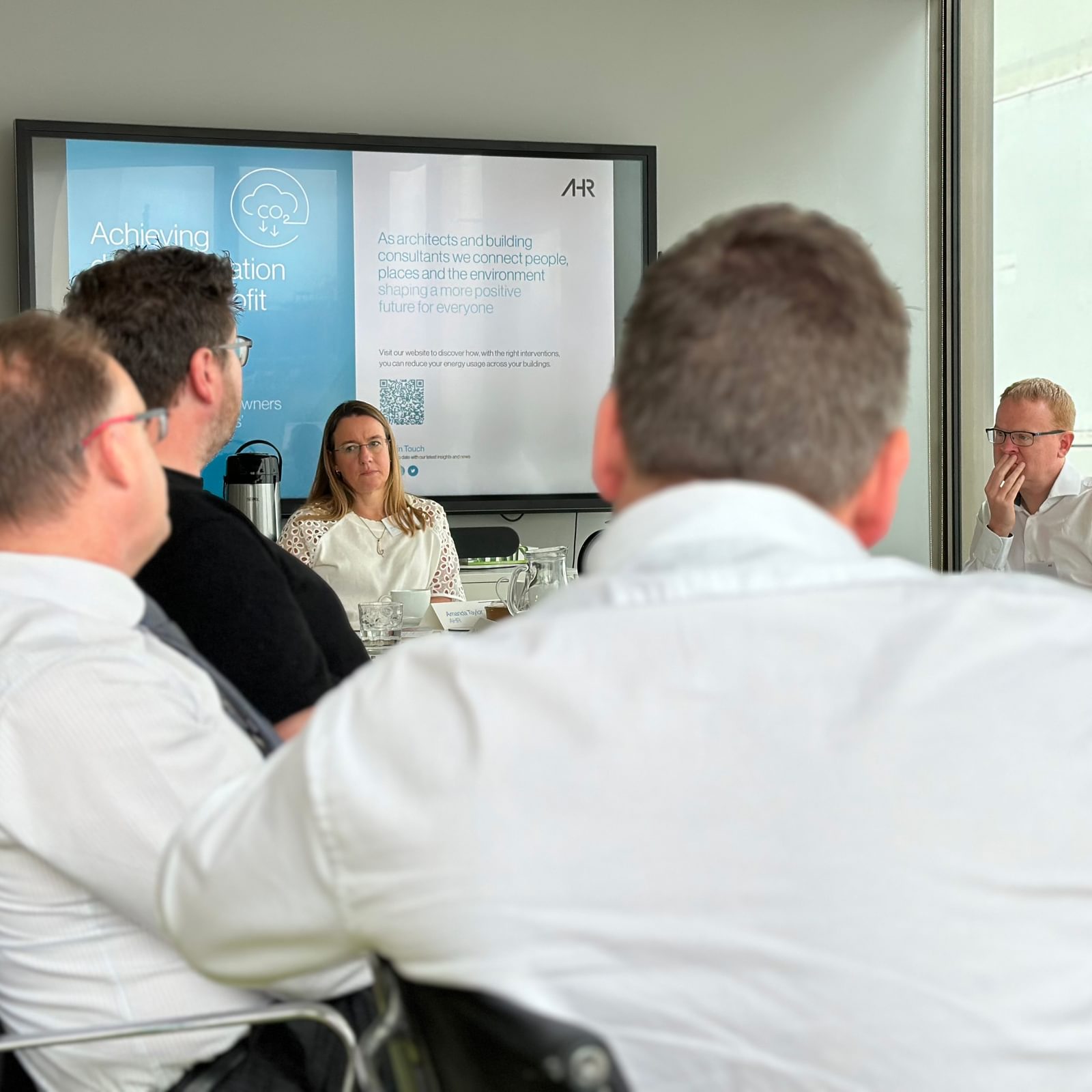
Practice News
Achieving decarbonisation: a thought-provoking conversation in Manchester
by AHR
Our third decarbonisation roundtable event of the year took place in Manchester, where participants joined us to discuss the challenges and opportunities in decarbonisation.
The discussion focussed on how we are navigating forthcoming changes in building performance standards and legislation, and brought up some interesting themes.
These included the need for stronger leadership in decarbonisation, investment in workforce training and upskilling, robust policies to drive initiatives, including the influence of the EU Taxonomy regulation and the development and integration of smart technologies into buildings for improved energy management.
Continue reading to uncover more from our insightful conversation.
1. Leadership in decarbonisation: inconsistency in Government policies
The discussion opened with expressions of frustration over the UK Government’s recent policy reversals, including the delay in phasing out gas boilers. Participants agreed that this inconsistency sends mixed signals that undermine efforts toward decarbonisation. Additionally, global events like the pandemic, recent political instability and rising energy costs have worsened economic challenges, complicating the decarbonisation pathway.
Despite some instances of leadership from the UK Government, these have been too infrequent and insufficient. Though it was acknowledged that businesses remain determined and continue to make progress toward their self-set sustainability goals. This determination, coupled with innovations in technology, has the potential to significantly impact decarbonisation efforts.
2. Workforce gaps: upskilling and education amid economic challenges
The ongoing need for collaborative dialogues to share knowledge was highlighted, alongside the necessity for investment in training and upskilling the workforce. Preparing the next generation for sustainable practices, such as retrofitting buildings, is crucial. Carbon literacy programmes were cited as pivotal in this educational drive. There is a growing focus on enhancing the skills and development of individuals within the industry regarding sustainability.
Notably, inspiration was drawn from initiatives like those in Ireland, which offers free skills development training for people in the construction industry. Additionally, in Scotland, we are seeing instances where Tier 1 contractors are actively contributing to this effort by funding the supply chain to enhance skills and education, further demonstrating the commitment to sustainable development within the industry.
Additionally, the importance of educating consumers was underscored, recognising that societal shifts in lifestyle and operations are equally essential for progress. While technologies like digital twins and smart building systems offer potential, their effective implementation depends on both confidence and legislative support, reinforcing the link between education and technological advancement.
3. Driving decarbonisation agenda: policies and customer-centric approaches
Participants agreed on the need for robust policies to drive decarbonisation across sectors, highlighting the challenges of meeting targets amidst economic pressures and supply-side dynamics influenced by future occupier demands. The current legislative environment, characterised by fluctuating standards and mixed messages as discovered earlier on, was identified as a barrier to sustainable development. The conversation then shifted to the importance of communicating the benefits of sustainable buildings more effectively, emphasising health, wellbeing and cost-effectiveness, rather than focusing solely on climate agendas.
The significant influence of international regulations, such as the EU Taxonomy regulation, New York’s Local Law 97 (LL97) and the IFRS S1 and S2 Sustainability Disclosure Standards, on policy and industry standards was highlighted, emphasising their role in shaping sustainable investments.The EU Taxonomy is a classification system designed to define and promote environmentally sustainable economic activities. It aims to combat greenwashing by establishing clear criteria for sustainability, guiding investments towards genuinely sustainable projects. Although the UK is no longer part of the EU, the Taxonomy still impacts the UK property market by influencing investment standards and sustainability practices. The framework focusses on six objectives: climate change mitigation, climate change adaptation, sustainable use and protection of water and marine resources, transition to a mostly circular economy, pollution prevention and control, and protection and restoration of biodiversity and ecosystems.
These international regulations are impacting the property sector in the UK already and we fully expect we’ll see elements of these incorporated into UK legislation in the future. Businesses seeking funding should understand the drivers influencing their funders and meet their requirements to qualify for and attract investment which influence their asset valuations. Additionally, aligning with these regulations can ensure that their properties remain attractive to a broader market, should they decide to sell in the future.
4. Shaping future buildings: integrating smart technologies and sustainable materials
The necessity of developing new materials and integrating smart technologies into buildings for more effective energy management was emphasised, alongside a broader understanding of the sustainability credentials of all materials used. The role of Environmental Product Declarations (EPDs) in the market chain was acknowledged as crucial, particularly for SMEs on the decarbonisation journey. A notable point from our discussion highlighted that while smaller companies have the skills for sustainability initiatives, they often lack the financial resources to engage fully with larger businesses.
Building on this foundation of sustainable materials and transparent certifications, future building standards must evolve to align with the net zero carbon 2050 goal and adapt to user behaviour. These standards are not just about setting higher performance benchmarks; they also must ensure that buildings are designed and operated in ways that promote sustainable living practices. By integrating user behaviour insights into building designs, we can create environments that naturally reduce energy consumption and support sustainable lifestyles.
5. Looking ahead: forward-thinking tools
Similarly to our recent discussion in Birmingham, parallels were drawn between the rapid rollout of the NHS app and the potential for using existing technology for similar applications to monitor home energy usage. Participants questioned why we can’t replicate this swift deployment to support behavioural change and energy management.
Looking ahead, we need to start adopting more available technology to support our efforts. We looked at the tools currently at our disposal, highlighting our intuitive and user-friendly retrofit toolkit which supports individuals and businesses make informed decisions in prioritising decarbonisation plans, whether for single assets or entire estates, thus aiding in the reduction of energy usage.Learn more about the toolkit here.
Overall, the event emphasised the importance of collaboration, consistent leadership, and integrating technology and education to advance the decarbonisation agenda. We look forward to the next.
To learn more about our efforts in achieving decarbonisation through retrofit and other initiatives, visit our perspectives page here.
Share on
Related Articles

Practice News
Achieving decarbonisation: Insights from Glasgow
Our second decarbonisation roundtable event of 2024 saw us in Glasgow, where we were joined by industry professionals to discuss and explore challenges and opportunities of decarbonisation.
Date: 8 May 24
by AHR

Practice News
Achieving decarbonisation: Continuing the conversation in Birmingham
We were joined by industry friends, eager to discuss the challenges and opportunities of decarbonisation and how we’re navigating forthcoming changes in building performance standards and legislation.
Date: 30 Apr 24
by AHR
Practice News
Achieving decarbonisation: What emerged during our roundtable discussion in Cardiff
In the third of our Achieving Decarbonisation roundtable series, we discussed retrofit and the challenges and opportunities it presents with our industry colleagues from Cardiff.
Date: 29 Nov 23
by AHR

Thought Leadership
The Retrofit Toolkit in action
The first of our retrofit studies challenged us to propose six interventions to decarbonise a typical school building to reduce its energy usage.
Date: 3 Feb 23
by Robert Hopkins
Director, Architecture



